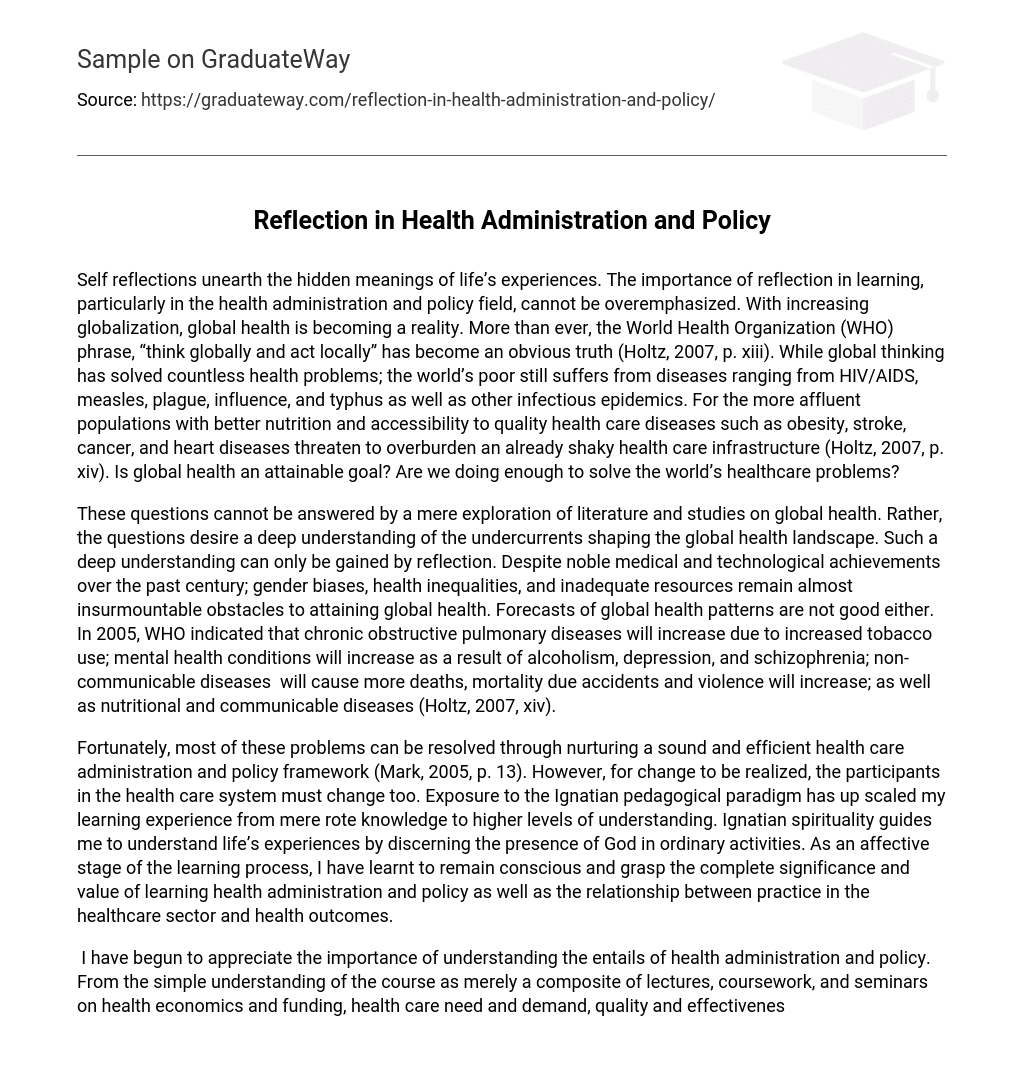Self reflections unearth the hidden meanings of life’s experiences. The importance of reflection in learning, particularly in the health administration and policy field, cannot be overemphasized. With increasing globalization, global health is becoming a reality. More than ever, the World Health Organization (WHO) phrase, “think globally and act locally” has become an obvious truth (Holtz, 2007, p. xiii). While global thinking has solved countless health problems; the world’s poor still suffers from diseases ranging from HIV/AIDS, measles, plague, influence, and typhus as well as other infectious epidemics. For the more affluent populations with better nutrition and accessibility to quality health care diseases such as obesity, stroke, cancer, and heart diseases threaten to overburden an already shaky health care infrastructure (Holtz, 2007, p. xiv). Is global health an attainable goal? Are we doing enough to solve the world’s healthcare problems?
These questions cannot be answered by a mere exploration of literature and studies on global health. Rather, the questions desire a deep understanding of the undercurrents shaping the global health landscape. Such a deep understanding can only be gained by reflection. Despite noble medical and technological achievements over the past century; gender biases, health inequalities, and inadequate resources remain almost insurmountable obstacles to attaining global health. Forecasts of global health patterns are not good either. In 2005, WHO indicated that chronic obstructive pulmonary diseases will increase due to increased tobacco use; mental health conditions will increase as a result of alcoholism, depression, and schizophrenia; non-communicable diseases will cause more deaths, mortality due accidents and violence will increase; as well as nutritional and communicable diseases (Holtz, 2007, xiv).
Fortunately, most of these problems can be resolved through nurturing a sound and efficient health care administration and policy framework (Mark, 2005, p. 13). However, for change to be realized, the participants in the health care system must change too. Exposure to the Ignatian pedagogical paradigm has up scaled my learning experience from mere rote knowledge to higher levels of understanding. Ignatian spirituality guides me to understand life’s experiences by discerning the presence of God in ordinary activities. As an affective stage of the learning process, I have learnt to remain conscious and grasp the complete significance and value of learning health administration and policy as well as the relationship between practice in the healthcare sector and health outcomes.
I have begun to appreciate the importance of understanding the entails of health administration and policy. From the simple understanding of the course as merely a composite of lectures, coursework, and seminars on health economics and funding, health care need and demand, quality and effectiveness, health politics and ethics, to more specific substantive issues such as Medicare, Medicaid and public health preparedness. More importantly, the course continues to enlighten me to act as a rescuer to the down trodden in a health system characterized by financial confusion. My constant and active participation in seminars continues to expand my understanding of health care policy issues and offers daily guidance in their management.
One of the greatest challenges in the world today is guaranteeing universal health care to the world’s population. Even though the last decades have borne transformative medical and technological developments, millions of the world’s poor and underprivileged continue to die from preventable diseases and illnesses. In essence, the world has become so desensitized that millions continue to be denied their basic rights to affordable, accessible, and quality health care. Inequalities in health delivery are rampant. Incidentally, the lectures and seminars in health administration and policy have awakened my desire to advocate for increased equality in the delivery of health care (Kane, 1993, p. 101). As opposed to just being an individual doing routine work in the complex health infrastructure, the desire for change forces me to promote the development of programs that specifically address the causes of health disparities, increase health care delivery to poor, underprivileged, and minority group. Together with other colleagues we remain committed to strengthening the health care system to make it beneficial to all.
Again, the nature of course instruction allows me to translate the context into action and evaluation. By understanding the context of topic analysis, subsequent reflection enables me to set thematic priorities in the future. Through reflection, I’ve learnt that the persistent bottlenecks in funding directly affect the quality and effectiveness of health care delivery. The net result is a resurgence of gender, class, and racial inequality issues, sustainability of health care provision, and problems with governance. These issues can be solved by constantly giving oneself to others and maintaining a professional commitment to social justice and betterment for all humanity.
Through compassion and spirituality, my course of life has completely changed. My coursework has ceased from being a robotic process towards achieving my degree but a flaming torch guiding me gently towards my true mission in life: helping the poor and underprivileged populations to access affordable and quality care through advocacy. It is only through shouldering individual responsibility and advocating for an improvement in health administration and policy responsiveness that equitable access, affordability, and sustainability can be realized in the health care system.
References
Holtz, C. (2007). Global Health: Issues & Policies. Massachusetts. Jones and Bartlett Publishers
Kane, T. J. (1993). Reflections on the Community Mental Health Movement: Implications for Administration, Administration and Policy in Mental Health and Mental Health Services Research, 21, 2, 101-105, Springer Netherlands
Mark, C. (2005). Reflection in healthcare practice: why it is useful and how it might be done, Work Based Learning in Primary Care, 3, 1, 13-22, Radcliffe Publishing Ltd





